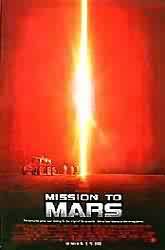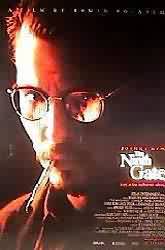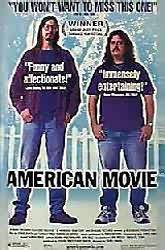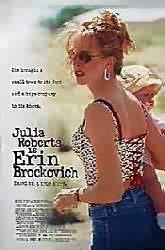 |
Mission to Mars (Dir: Brian De Palma, Starring Gary Sinise, Don Cheadle, Connie Nielsen, Jerry O'Connell, Tim Robbins, Jill Teed, Bill Timoney, Kim Delaney, and Armin Mueller-Stahl) BY: DAVID PERRY |
| Cinema-Scene.com > Volume 2 > Number 10 |
Cinema-Scene.com
Volume 2, Number 10
This Week's Reviews: Mission to Mars, The Ninth Gate, American Movie, Erin Brockovich.
This Week's Omissions: Tumbleweeds.
 |
Mission to Mars (Dir: Brian De Palma, Starring Gary Sinise, Don Cheadle, Connie Nielsen, Jerry O'Connell, Tim Robbins, Jill Teed, Bill Timoney, Kim Delaney, and Armin Mueller-Stahl) BY: DAVID PERRY |
I know from excess experience that there is a large deluge of horrible action films to be released every year. They mainly come out in the Summer, but every once and a while they cross over into the Spring and Fall/Winter. So normally when entering a film like The Mummy or Wild Wild West, I'm ready to hate the film. In fact with both of those cases, I had liked a previous trailer or ad campaign from each of those film, letting my guard down a little, but I was still weary. But the trailers for Wild Wild West and The Mummy were not far cries from their film; in fact, both trailers more or less showed the best parts of their films along with some of the corny comedy of The Mummy and the utter cheesiness of Wild Wild West. That was not the case with Mission to Mars. I actually refrained from seeing any of the television commercials, but what was shown in the theatrical trailer was enthralling. A grand homage to Kubrick's 2001: A Space Odyssey by the greatest of all film lifters, Brian De Palma, with stunning special effects, big suspenseful music, and a great cast (including Tim Robbins, Don Cheadle, and Gary Sinise). But the stunning sci-fi drama that the trailer set me for was not there; instead I found myself sitting through a thoroughly well made The Mummy.
As much as I hated the film itself, with its horrendous story and mind numbing comedy, I actually adored the helming by De Palma. It is not necessarily that the great homaging auteur has lost his touch with filmmaking, it is just that he cannot choose a good script. De Palma was on top of his game ten years ago; he had the acclaimed The Untouchables under his belt, as well as some underrated modern masterpieces like Dressed to Kill (Hitchcock homage), Scarface (Howard Hawks homage), Body Double (Hitchcock homage), Carrie (Hitchcock homage), and Blow Out (Michaelangelo Antonioni homage). Then he was given a big studio film from a highly successful novel called The Bonfire of the Vanities. Suddenly everything he had made before was forgotten, and he was a laughing stock -- much like Michael Cimino with Heaven's Gate -- and De Palma really has not come to rebounding. Since then he has made the mixed Carlito's Way, the mediocre Raising Cain, the high grossing but head scratching Mission: Impossible, and the good looking Snake Eyes (for the record, I, a stout De Palma fan, have liked all of those to some extent -- hell, I didn't even hate The Bonfire of the Vanities). I would have thought Mission to Mars to be the film that could renew his career as a beautiful film with a large theatrical gross. Unfortunately, the film will only bring the latter remark.
Mission to Mars follows the rescue ship sent to save a stranded group of astronauts on the surface of Mars. This ship has all the needed characters, the heroic captain (Robbins), his love interest (Nielsen), the computer wiz kid (O'Connell; how's that for miscasting), and the learned down-on-his-luck astronaut (Sinise). They make way to Mars in beautiful camera set-ups and seamless special effects, but that cannot save the all-in-all horrid story. I spent the first hour of this film looking at the film's direction and cinematography, hoping to like the film, but once it gets utterly lost in its final, unintentionally hilarious ending, I could not help but despise the film.
The cast is really hit and miss. Sinise seems in a bit of a poor period -- this and Reindeer Games do not make for a very good resume. None of the cast really shines, especially the normally enjoyable Cheadle as the captain of the stranded Mars mission (by the way, his character is named Luc Goddard after the famous French New Wave director Jean-Luc Goddard). That is none but Tim Robbins. I happen to think that Robbins is one of the best actors that America has to offer, even if he can make some bad choices every once and a while (Nothing to Lose, anyone?). I'm not going to tell how, for sake of spoiling the film, but there is a moment in which he looks just like Orson Welles in his old age makeup for Citizen Kane.
De Palma and cinematographer Steven H. Burum do their best to make the film look pretty good, as does art director Tom Valentine and special effects supervisors Hoyt Yeatman and John Knoll (even though the special effects are pretty bad in the film's third act). I normally enjoy the orchestral work of Ennio Morricone, but I'm not hearing it anymore. You may remember that I remarked on the utter sappiness of his score for The Legend of 1900, but this takes the cake with drowning music making scenes unintentionally funny. And lets not get into the script from Jim Thomas, John Thomas, and Graham Yost, the former two of whom happened to be behind the story for Wild Wild West of all films.
Mission to Mars, as much as it pains me to say
it, is not this Spring's The Matrix.

| BUY THIS FILM'S FROM AMAZON.COM |
REVIEWS OF THIS FILM |
 |
The Ninth Gate (Dir: Roman Polanski, Starring Johnny Depp, Frank Langella, Emmanuelle Seigner, Barabara Jefford, Jack Taylor, José López Rodero, James Russo, Willy Holt, Maria Ducceshi, and Jacques Collard) BY: DAVID PERRY |
The Ninth Gate is the latest and the best of the barrage of religious themed thrillers this year. After everything from End of Days to Stigmata, I'm a little weary of Lucifer threatening the world (as well as a little tired of Gabriel Byrne in these films -- come on, Gabriel, you can do better), but I must admit to enjoying this run through. I expect that this one will probably end up as the best of the current sub-genre, especially considering the dismal early word on Lost Souls (due in theatres September 2000). Of course it should be no real surprise that The Ninth Gate succeeds since it is the only one from a long experienced and highly respected director (unless Stigmata director Rupert Wainwright has some large following that I do not know about).
Roman Polanski is one of my favorites; his human touch is rarely paralleled by those directors that have learned from him. I recently saw his 1980 film Tess for the first time and was blown away at his use of the camera to grasp the emotions in Nastassia Kinski's performance, pure genius. Polanski has brought some of my favorite films to the screen, films like Chinatown, Repulsion, Rosemary's Baby, Macbeth, and the incredibly underrated Death and the Maiden. But I will admit that The Ninth Gate is big change of pace, much in the same vein as Lynch going for The Straight Story (I'm going to milk that for all it's worth); the gothic appeal to The Ninth Gate is not something that occurs in old French New Wavers, much less Polanski. What would Eric Rohmer or Jean-Luc Goddard say of this piece from one of their students.
The only thing that I have seen from Polanski that was near this was Repulsion, my choice for the best film of 1965, a stark thriller. But Repulsion worked with those scary moments of silence, broken by the most material things, this film is a drastic change with big, lavish moments of action. In fact, I do not think that there has ever been a great deal of fire in a Polanski film, much less an explosion. The Ninth Gate does not even take the same human approach that he had in Repulsion and all his other works; in a way The Ninth Gate is his cross over film, a nice artsy film masquerading in a tense action film.
The whole reason that I liked The Ninth Gate is not for its Polanski-esque moments, especially since there aren't really any. The film is just a nice, enjoyable detour from the bad action films I see all the time. Is it a great film? No, but it does have the kick and the smarts that most action films fail to take notice of. Think of the films that Michael Bay would make if he actually had something in the cranium.
The Ninth Gate is the story of a book appraiser's search for a the secret to a certain seventeenth century novel that seems to have been cowritten by Lucifer. The drawings within the three remaining texts of this novel, The Nine Gates of the Kingdom of the Shadows, differ at various points: some are signed by Aristide Torchia, others by LSF, Lucifer himself. This appraiser Dean Corso has been hired by Boris Balkan, a collector of religious themes novels, who recently purchased one of the copies and wants to know of the other two and the probability of purchasing them. Corso sets out, meets some varied characters, has some big revelations, is helped by a guardian angel (Seigner, Polanski's wife), and then attempts to amend what he has done. All this in the films somewhat drawn-out 132 minute length.
Yes, the story is a bit hackneyed at times, and the ending is far from sufficient, but I still felt that the film worked on some level. Maybe it is that fun-loving Speed fan in me (as opposed to that snooty The Seventh Seal fan in me, I guess), but this film certainly entertained me, and I was at least invested in the characters, which I cannot say for most thrillers. The direction is exquisite and master cinematographer Darius Kondji (Se7en) is in top form. Also of note are the films great sets from Philippe Turlure, Gérard Viard, and Dean Tavoularis and the score from Wojciech Kilar.
No, The Ninth Gate is not a high point of
Polanski's career, but at least it is not a big mistake like the recent ones from Brian De
Palma, John Frankenheimer, and Mike Nichols.

| BUY THIS FILM'S FROM AMAZON.COM |
REVIEWS OF THIS FILM |
 |
American Movie (Dir: Chris Smith, Appearances by Mark Borchardt, Mike Shank, Bill Borchardt, Tom Schimmels, Miriam Frost, Robert Richard Jones, and Sherrie Beaupre) BY: DAVID PERRY |
Coven, pronounced with a long o, is one of those films that George Romero might have made in his early years. It is a stark black and white blood bath with scatological dialogue and references to film forefathers. The big difference is that Coven, of course, is not such a film from the pre-Philadelphia Romero. The man behind, as well as in front of, the camera is Mark Borchardt a young Milwaukee native with one dream: to make the great American movie. Since 1990, Borchardt has been working on a film called Northwestern, his life work. But money is not flowing for this young filmmaker and he must make small horror films to produce money for Northwestern. Coven is the current film to make that cashflow for Northwestern, the type of cheesy horror films that Ed Wood would smile at.
And that is the way American Movie is so interesting, while trivializing what is being made it is still portraying the complete awe of making a film, much in the same way Tim Burton treated his subject in Ed Wood. There is no question of whether or not Coven is a good film, the only people that seem to think that it is great are those involved. These people are some of the most absurd people you'd ever met in a documentary; you might even think that David Lynch must of had something to do with the film.
In fact the whole reason that the film does so well comically is thanks to its varied, odd-ball characters. Sure, Borchardt is an interesting fellow, and much of what he has to say is hilarious, but there is much more in his silent best friend, Mike Shank, party-going guitar player by day, independent film actor by night. The faces and anecdotes that Mike throws out are so hilarious that the entire audience I saw it with was rolling in the aisles. Then there is Mark's elder Uncle Bill Borchardt, a relative that secures money for Mark's film escapades since Mark's father will not give money due to the vulgar language. Uncle Bill could be considered this year's most interesting character, a man sitting on over $200,000 in his mobile home writing songs (my favorite lyrics: "Ill visit your grave when you die/But I don't know where it is/So where is it?"). I think that this film could have been even better had it been about Uncle Bill: The Great American Producer.
Documentarians Chris Smith and Sarah Price never really attempt to make the film look good in a cinematic view, which I think pays off. The hilariously bad ideas Borchardt has for camera angles might not have melded well with a documentary that attempts its own catchy camera use. The score, written and performed by Mike Shank is about as catchy a tune as a burned-out drug and alcohol busted Milwaukee native with an evident learning disorder could write. And this muddled form seems to be exactly what is present in all those involved in Coven and Northwestern, these are some really messed up people. Luckily for us, their problems make for great comedy. American Movie is one of the funniest comedy documentaries I have seen since Roger & Me, in fact American Movie might actually be funnier (I need to see Roger & Me again before I can come to that conclusion).
Oh, and why exactly is Coven pronounced like
co-ven? According to Mark Borchardt, the correct pronunciation "sounds too much
like oven."

| BUY THIS FILM'S FROM AMAZON.COM |
REVIEWS OF THIS FILM |
 |
Erin Brockovich (Dir: Steven Soderbergh, Starring Julia Roberts, Albert Finney, Aaron Eckhart, Marg Helgenberger, Scarlett Pomers, Peter Coyote, Cherry Jones, Scotty Leavenworth, and Gemmenne De la Peña) BY: DAVID PERRY |
Steven Soderbergh gone commercial, can it be true? Yes, Erin Brockovich is a nearly by-the-book genre picture, but it also goes far beyond the clichés of the films it follows by having the signature pizzazz of a Soderbergh film. The drained look of the film, which perfectly worked with The Limey, is present here as he takes on one of the most over done scenarios in film: the big vs. little courtroom drama. Sure much of this film was seen in The Rainmaker and A Civil Action, but neither of those took on the issues in such a decidedly independent film touch. Soderbergh could make the most uninteresting ideas interesting, just look at Kafka, and this normally cliché film is no exception.
Erin Brockovich is the true story of a woman that took her self from financial problems to help people make money on their claims for their families well being. Erin (Roberts) is a young, divorced mother raising two children. After a car wreck leaves her able to make a pay day, she takes the help of a lawyer named Ed Masry (Finney), and the two lose the case after Erin loses her steam on the witness stand. With no real jobs on the horizon, Erin decides to force herself into a position in Masry's law office. After Masry decides to let her stay, Erin takes on a personal effort to help people that are beginning to find cancerous cells, and are not really taking into account the fact that they live next to a nuclear power plant.
Erin is a strong and able woman, as one would expect from such a film, but there are also many fault that Soderbergh and screenwriter Susannah Grant (and Richard LaGravenese according to some press material) lets Erin show. She is a bit domineering, stubborn, and fails to recept the lack of affection she shows her children (Leavenworth and De la Peña) and neighbor/boyfriend (Eckhart; this man is truly a method actor). Roberts is fine here as Erin, in fact I'd say that this is the best performance from Hollywood's renewed Golden Girl. I was surprised at the effective dramatic range that Roberts shows here, something that she has failed to show-off before now.
As great as Roberts, Eckhart, and all others may have been, the real star is, without a doubt, the great Albert Finney. It seems that he is in a new top-form giving off great work in recent day films like Breakfast of Champions, A Man of No Importance, and Washington Square, but he has never looked this good. I was astounded with his earlier work in films like The Dresser, Tom Jones, and Murder on the Orient Express, all of which brought him Oscar nominations, and I dearly hope that this film can be his ticket to another nomination, if not a long deserved win (I don't care if Robert Duvall was the man of the moment in 1984, Finney deserved the Best Actor award for The Dresser).
I happen to adore the look of Soderbergh films, with their meticulous design, grainy feel, and lavish lighting. Erin Brockovich has him again working with the master team of cinematographer Edward Lachman and editor Anne V. Coates, to great effect. Admittedly, these three did better work cinematically on The Limey, but there seems to be much more substance to their work here. Where the deeply cold colors of The Limey helped its dramatics, the flushed browns of Erin Brockovich makes for substantial effect in both the overall aesthetic of her life and the comical relief intertwined with the film.
I for one, hope that with Erin Brockovich,
Steven Soderbergh et al. will find that long deserved place in the sun.

| BUY THIS FILM'S FROM AMAZON.COM |
REVIEWS OF THIS FILM |
Reviews by:
David Perry
©2000, Cinema-Scene.com
http://www.cinema-scene.com